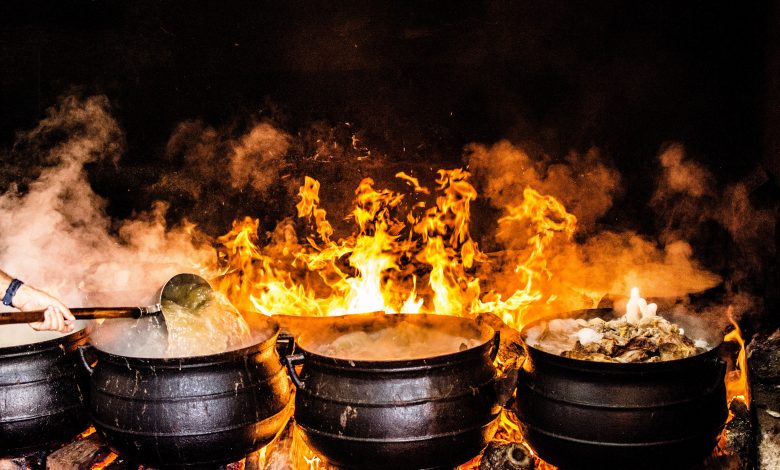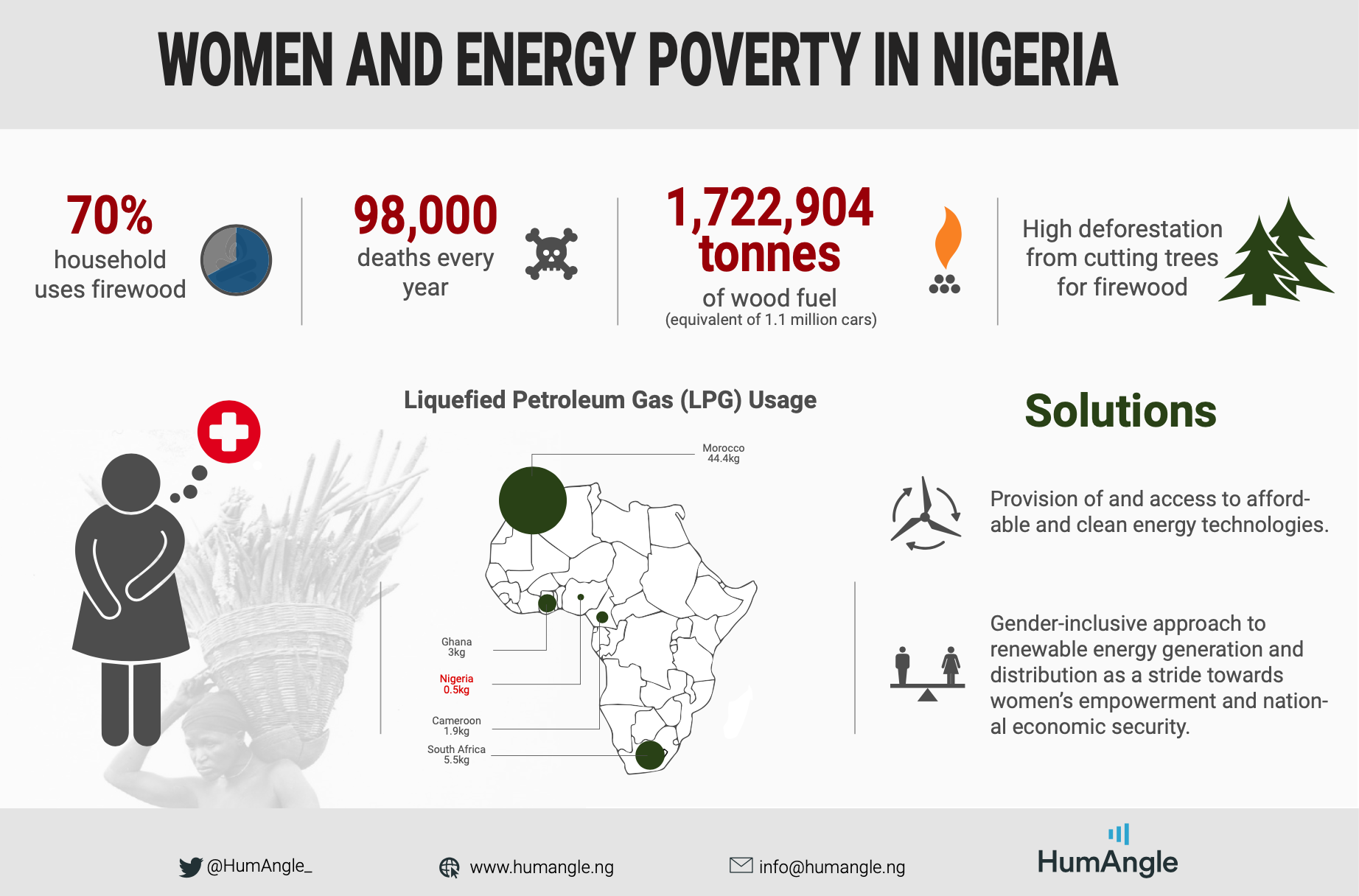Energy Poverty: Rural women and the curse of firewood

Cooking is essential as humans must feed. In Nigeria, it is predominantly a woman’s job and while it is conditioned as a source of nourishing, it is fast condemning the women to their early graves. As 19-year-old Aisha Kaigama knelt to blow the fire, the balls of black smoke slapped across her face, tear-gassing her with intensity, at the same time choking and forcing her nostrils to run a steady flow of slimy liquid. She is now desperate to take in some fresh air.
Aisha goes on with this routine intermittently for as long as it takes to finish the cooking. “I have to cook, it is my duty and firewood is the most available way,” she offers to explain to the HumAngle reporter who visited Kuchigoro, a rural community in the outskirts of Abuja, the capital city of Nigeria. Millions of Nigerian women share in Aisha’s frustrations and are stuck in a life-threatening daily practice.
It is exactly what Mariam Sabo, a mother of three is doing when the reporter walks into her small kitchen. The walls had been blackened from years of firewood cooking and as they were talking, Sabo’s three-year-old son sat at the corner of the kitchen, eating masa, wiping his tiny eyes too because of the harsh smoke.
When asked why she cooked with firewood, She said, “It is the only way we know. We cannot afford gas and our people have been cooking like this for years.” She admitted that she felt sharp pains in her eyes and back pain from bending often but claimed that it was nothing she could not handle.
These symptoms are common with firewood use and a 2013 World Health Organisation (WHO) report revealed that 98,000 Nigerian women die each year from the use of firewood, with thousands more at the risk of serious health problems.
According to Dr. Habiba M. Ibrahim of the University of Abuja Teaching Hospital, there is a strong relationship between firewood and women’s health.
She said, “aside from the poor quality of life associated with constant use of firewood, there are still a few diseases directly related to using of firewood, like chronic obstructive pulmonary disease, in which their lungs undergo repeated scarring and fibrosis, causing permanent damage to the lungs, and causing severe respiratory problems in the future.
“There are also some congenital diseases seen in babies that have been associated with exposure to intense heat, among other things, like congenital heart diseases,” Ibrahim added.
HumAngle reports that medical data also point to other health implications such as fissures in the eyes, asthma and other forms of respiratory-related illnesses.
The focus is on women as they spend most of the time cooking, raising questions as to their general wellbeing in spite of global equality and empowerment efforts. There is a need to advance these programmes through affordable and clean energy for households.
On March 8, Nigeria joined the rest of the world to commemorate International Women’s Day. The United Nations first celebrated this day in 1975 and 1977. UN member states proclaimed March 8 as UN day for women’s rights and international peace.
The theme for 2020 is aligned with the UN Women’s new multigenerational campaign ‘Generation Equality.’ To achieve this, specific efforts must be put into providing affordable and clean energy specifically for low income and rural communities.

Women and girls are disproportionately affected by energy poverty, due to cultural dynamics and gender roles that contribute to inequality. Many women are trapped in a vicious cycle of poverty that reduces their access to education, economic opportunities and increases the risk of sexual and gender-based violence.
Energy poverty contributes to the unsustainable and unhealthy practice of using dirty and polluting fuels for cottage industries and cooking.
According to the United Nations Development Programme (UNDP), over 70 percent of Nigerian households still rely on firewood for cooking.
A 2013 report by the Energy Commission of Nigeria showed that wood fuel in Kaduna State is the most highly consumed fuel, accounting to about 1,722,904 tonnes per year, consumed per person in the state.
HumAngle gathered that income is a major factor in determining the choice of cooking fuel. In most rural areas, women go out to fetch the wood themselves by rummaging through forests and bushes – creating a deforestation problem that has long-reaching negative effects on climate.
Additionally, firewood and charcoal use affect productivity, and the health and well being of women and girls, as they spend a lot of time collecting firewood and inhaling harmful smoke. This constitutes energy poverty.
Solving this means providing better work opportunities for women to afford clean energy alternatives in their homes and create more access points to these alternatives, especially Liquefied Petroleum Gas (LPG).
The Global Alliance for Clean Cookstoves estimates that the carbon impact of LPG is substantially less than that of other forms of solid biomass burned in a stove, and produces fewer harmful emissions than other fossil fuels, including kerosene.
The report, however, showed that Nigeria ranks among the lowest LPG-consuming states in Africa. It uses less than 0.5 kilogrammes (kg) per capita, compared with 1.9kg in Cameroon, 3kg per capita in Ghana, 5.5kg in South Africa and 44.4kg in Morocco.
The availability of affordable and clean energy technologies such as solar and wind, will reduce the need for dirty generators and provide an enabling environment for better productivity of cottage industries commonly used by women in rural and low-income communities.
Gender-inclusive approach to renewable energy generation and distribution contributes to women’s empowerment and national economic security. The provision of cleaner stoves, green charcoal briquettes manufactured from agricultural waste and LPG is important to the health of these women.
These alternatives produce less harmful and polluting emissions than firewood and other fossil fuels, replacing the need for charcoal and firewood while aiding the positive conversion of the time spent by women and girls collecting firewood.
Nasreen Al-Amin, a climate justice advocate in Nigeria and founder of Surge Africa, describes the gender-inclusive transition to clean energy as an opportunity to develop our energy sectors and provide women and girls with economic opportunities.
This, she says, can be achieved by mainstreaming women and gender rights into climate policies and in the implementation of the nationally determined contributions of the Paris Agreement ratified in 2017.
Feature image by Devon Rockola from Pexels
Support Our Journalism
There are millions of ordinary people affected by conflict in Africa whose stories are missing in the mainstream media. HumAngle is determined to tell those challenging and under-reported stories, hoping that the people impacted by these conflicts will find the safety and security they deserve.
To ensure that we continue to provide public service coverage, we have a small favour to ask you. We want you to be part of our journalistic endeavour by contributing a token to us.
Your donation will further promote a robust, free, and independent media.
Donate HereStay Closer To The Stories That Matter




